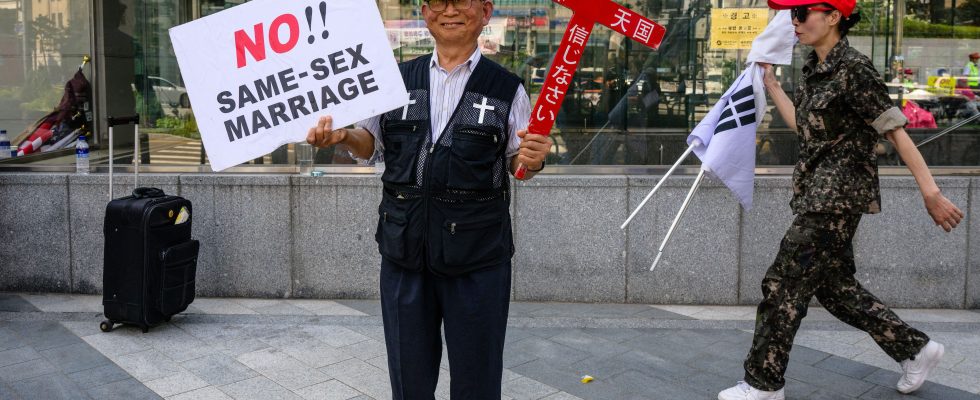Two streets, two atmospheres, a few hundred meters apart, in the heart of the South Korean capital, in the crushing heat of July 1st. On one side, posters announce hell for homosexuals; on the other, an avenue colored with rainbow flags, where floats of drag queens parade in a festive atmosphere. At first, the conservative mayor of the capital, Oh Se-hoon, had refused to authorize the LGBT march, planned, as every year, on the esplanade of the town hall, to organize instead a Christian counter-event, openly homophobic.
A month of negotiations later, the gay pride was finally able to take place a few streets away, the mayor of Seoul having nevertheless insisted on specifying that he could not “personally approve of homosexuality”. If the parade, under police escort, did not experience a clash, that of Daegu, in the south of the country, saw two weeks earlier confront the police and nearly 500 city officials, sent to block it.
These tensions reflect the divisions in society on the question of LGBT rights, between Christians and progressive activists. Protestant and conservative groups exert considerable influence on the political debate. Very organized, they have already pushed back more than one deputy on bills against discrimination of homosexual and transgender people.
“In the 1960s, the influential psychiatrist Han Tong-se developed a fallacious theory that South Korea, then economically and technologically backward after the destruction of the Korean War, was morally superior to ‘the West. ‘ in terms of morals, because it was a ‘healthy’ Christian nation, where homosexuals were supposed to not exist”, explains Todd A. Henry, historian at the University of California, San Diego. This idea, which has infused the South Korean imagination, could explain the reaction of fundamentalist Protestants to the affirmation of the LGBT movement, which emerged in the 1990s after years of dictatorships.
“Risked for their career”
40% of South Korean elected officials declare themselves Protestant, the subject is taboo for the two major parties. “It can be risky for their career to show their position,” say the organizers of the Seoul Pride march. In fact, MPs who have shown their support for the LGBT community have been bombarded with emails from religious groups or targeted by protests outside their windows.
A bill, from a small party, to legalize marriage between same-sex couples certainly arrived at the National Assembly in June, but the text has little chance of being voted on. However, the country is beginning to evolve on this subject. In February, justice recognized for the first time homosexual couples as eligible for marital health coverage. This device allows an unemployed person to benefit, free of charge, from the health coverage of their spouse. Another sign, Cha Hae-young, 35, a member of the capital’s city council since 2022, has become the country’s first openly gay elected official.
The lack of legal protection against discrimination nevertheless pushes many Koreans, gay or transgender, to live in hiding. “It is common to lose your job or be harassed after coming out, says Ryan Thoreson, professor at the University of Cincinnati. However, more and more people support LGBT people, including within the Christian community.” In reality, while the weight of the Church tends to decrease, the debate is above all generational, in an aging country.
In fact, public opinion remains divided: only 55% of South Koreans are in favor of marriage for all. Korean society remains largely conservative, particularly on women’s rights, another subject of division. The 2022 presidential campaign was marked by anti-feminist demonstrations. The current South Korean president, Yoon Suk-yeol, had surfed on this wave during his campaign. It should be noted that the young people were as retrograde as their elders. At the time, three out of four men under 35 spoke out against feminist ideas.
